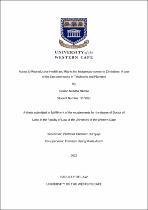Access to reproductive health and rights for indigenous women in Zimbabwe: A case of the San community in Tsholotsho and Plumtree
Abstract
Access to healthcare, including reproductive health, is an essential human right that necessitates the attainment of human development, non-discrimination between genders, and promotes women’s rights. Reproductive health and rights enable women to make independent decisions and choices relating to their bodies and make it possible to keep women healthy, safe, and dignified. Despite this importance, indigenous women often struggle to have access to satisfactory reproductive health services and have poorer outcomes compared to the general populace. Indigenous women from Zimbabwe are not exempt from this predicament. It is against this background that this study aims to interrogate the extent to which San indigenous women in Zimbabwe enjoy access to reproductive health and rights. The elements of reproductive health and rights which are the main focus of this study are: “prevention and treatment of sexually transmitted infections (STIs), including HIV and AIDS and cervical cancer; maternal health; and voluntary informed and affordable family planning services.” Studies have been conducted on access to other rights by San people, such as their right to education and to decide their cultural and ethnical integrity.

